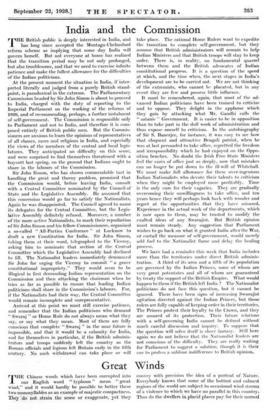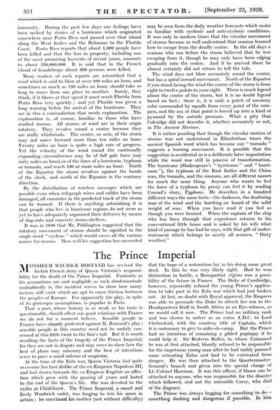Great Winds
THE Chinese words which have been corrupted into our English word " typhoon " mean "great wind," and it would hardly be possible to better these two monosyllables as an example of majestic compactness. They :cki nOt strain the sense of exaggerate, :yet- they convey with precision the idea of a portent of Nature. Everybody knows that some of the hottest and calmest regions of the world are subject to occasional wind storms of a violence to which we have no parallel in this country. Thus do the dwellers in placid places pay for their normal immunity. During the past few days our feelings have been racked by stories of. a hurricane which originated somewhere near Porto Rico and passed over that island • along the West Indies and the Bahamas to the Florida Coast.. Porto Rico reports that about 1,000 people have been killed and that the Joss in property, including one of the most promising harvests of recent years, amounts to about £20,000,000. It is said that in the French island of Guadeloupe about 300 persons were killed.
Many readers of such reports are astonished that a wind which is said to blow at over 100 miles an hour, and sometimes as much as 150 miles an hour, should take so long to move from one place to another. Surely, they think, if it blows at that speed it must reach Florida from Porto Rico very quickly ; and yet Florida was given a long warning before the arrival of the hurricane. They see in this, a contradiction that needs explanation. The explanation is, of course, familiar; to those who have studied storms. All storms of wind are in their origin rotatory. They revolve round a centre because they are really whirlwinds. The centre, or axis, of the storm may not move forward more than ten miles an hour. Twenty miles an hour is quite a high rate of progress. Yet the velocity of the wind round the continually expanding circumference may be of full gale force (say sixty miles an hour) or of the force of a hurricane, typhoon or tornado, and reach 130 or more miles an hour. North of the Equator the storm revolves against the hands of the clock, and south of the Equator in the contrary • direction.
By the distribution of wireless messages which are possible even when telegraph wires and cables have been damaged, all countries in the predicted track of the storm can -be Warned. If there is anything astonishing it is that people who live in hurricane regions do not seem as -yet to have adequately organized their defences by means of dug-onto and cencrete storm-shelters.
It was' in 1848 that Mr. Piddington suggested that the rotatory Movement of storms should be signified in the Single word "cyclone " which would cover all the various names for storms. How well his suggestion has succeeded may be seen from the daily weather forecasts which make us familiar with cyclonic and anti-cyclonic conditions. It was only in modern times that the circular movement of storms became so well understood that seamen learned how to escape from the deadly centre. In the old days a seaman who ran before the storm believed that he Was escaping from it, though he may only have been edging gradually into the centre. And if he arrived there he almost certainly did not return to tell the tale.
The wind does not blow accurately round the centre, but has a spiral inward movement. North of the Equator if you stand facing the wind the centre of the storm is from eight to twelve points to your right. There is much legend about the centre of the storm, but it is no doubt legend based on fact ; there is, it is said, a patch of uncanny calm surrounded by squalls from every point of the com- pass, and the sea at that point. is forced up into a kind of pyramid by the outside pressure. What a pity that Coleridge did not describe it, whether accurately or not, in The Ancient Mariner.
It is rather puzzling that though the circular motion of storms was not understood in Elizabethan times the ancient Spanish word which has become our " tornado " suggests a turning movement. It is possible that the suggestion is accidental or is a deliberate later importation while the word was still in process of transformation. The hurricane (Shakespeare's " hyrricano " and " hurri- cano "), the typhoon of the East Indies and the China seas, the tornado, and the simoom, are all different names for much the same thing. Anyone who wants to feel the force of a typhoon by proxy can feel it by reading Conrad's story, Typhoon. He describes in a hundred different ways the same facts—the darkness, the deafening roar of the wind and the bursting on board of the solid weight of seas. When you have read it you feel as though you were bruised. When the captain of the ship who has been through that experience returns to his conventional little home and is asked by his wife what kind of passage he has had he says, with that gift of under- statement which belongs to nearly all seamen, "Dirty weather."







































 Previous page
Previous page